Related Research Articles
Five-card draw is a poker variant that is considered the simplest variant of poker, and is the basis for video poker. As a result, it is often the first variant learned by new players. It is commonly played in home games but rarely played in casino and tournament play. The variant is also offered by some online venues, although it is not as popular as other variants such as seven-card stud and Texas hold 'em.

Poker is a family of comparing card games in which players wager over which hand is best according to that specific game's rules. It is played worldwide, but in some places the rules may vary. While the earliest known form of the game was played with just 20 cards, today it is usually played with a standard deck, although in countries where short packs are common, it may be played with 32, 40 or 48 cards. Thus poker games vary in deck configuration, the number of cards in play, the number dealt face up or face down, and the number shared by all players, but all have rules that involve one or more rounds of betting.
Blinds are forced bets posted by players to the left of the dealer button in flop-style poker games. The number of blinds is usually two, but it can range from none to three. When there are two blinds they are called the small blind and the big blind.
In poker, pot odds are the ratio of the current size of the pot to the cost of a contemplated call. Pot odds are compared to the odds of winning a hand with a future card in order to estimate the call's expected value. The purpose of this is to statistically guide a player's decision between the options of call or fold. Raising is an alternative to place this decision on the opponent.
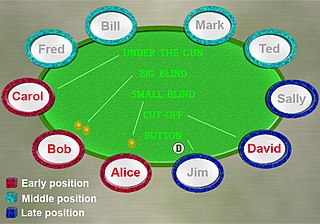
In the game of poker, the play largely centers on the act of betting, and as such, a protocol has been developed to speed up play, lessen confusion, and increase security while playing. Different games are played using different types of bets, and small variations in etiquette exist between cardrooms, but for the most part the following rules and protocol are observed by the majority of poker players.
Five-card stud is the earliest form of the card game stud poker, originating during the American Civil War, but is less commonly played today than many other more popular poker games. It is still a popular game in parts of the world, especially in Finland where a specific variant of five-card stud called Sökö is played. The word sökö is also used for checking in Finland.
Seven-card stud, also known as Seven-Toed Pete or Down-The-River, is a variant of stud poker. Before the 2000s surge of popularity of Texas hold 'em, seven-card stud was one of the most widely played poker variants in home games across the United States and in casinos in the eastern part of the country. Although seven-card stud is not as common in casinos today, it is still played online. The game is commonly played with two to eight players; however, eight may require special rules for the last cards dealt if no players fold. Playing with nine players is possible.

Texas hold 'em is one of the most popular variants of the card game of poker. Two cards, known as hole cards, are dealt face down to each player, and then five community cards are dealt face up in three stages. The stages consist of a series of three cards, later an additional single card, and a final card. Each player seeks the best five-card poker hand from any combination of the seven cards: the five community cards and their two hole cards. Players have betting options to check, call, raise, or fold. Rounds of betting take place before the flop is dealt and after each subsequent deal. The player who has the best hand and has not folded by the end of all betting rounds wins all of the money bet for the hand, known as the pot. In certain situations, a "split pot" or "tie" can occur when two players have hands of equivalent value. This is also called "chop the pot". Texas hold 'em is also the H game featured in HORSE and HOSE.
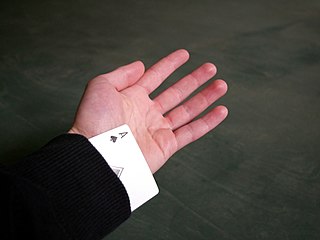
Cheating in poker is any behavior outside the rules of poker that is intended to give an unfair advantage to one or more players.
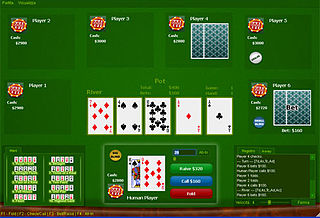
Online poker is the game of poker played over the Internet. It has been partly responsible for a huge increase in the number of poker players worldwide. Christiansen Capital Advisors stated online poker revenues grew from $82.7 million in 2001 to $2.4 billion in 2005, while a survey carried out by DrKW and Global Betting and Gaming Consultants asserted online poker revenues in 2004 were at $1.4 billion. In a testimony before the United States Senate regarding Internet Gaming, Grant Eve, a Certified Public Accountant representing the US Accounting Firm Joseph Eve, Certified Public Accountants, estimated that one in every four dollars gambled is gambled online.
The following outline is provided as an overview of and topical guide to poker:
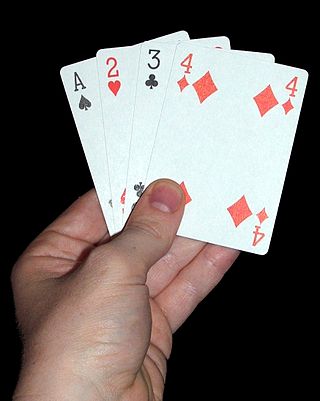
Badugi is a draw poker variant similar to triple draw, with hand-values similar to lowball. The betting structure and overall play of the game is identical to a standard poker game using blinds, but, unlike traditional poker which involves a minimum of five cards, players' hands contain only four cards at any one time. During each of three drawing rounds, players can trade zero to four cards from their hands for new ones from the deck, in an attempt to form the best badugi hand and win the pot. Badugi is often a gambling game, with the object being to win money in the form of pots. The winner of the pot is the person with the best badugi hand at the conclusion of play. Badugi is played in cardrooms around the world, as well as online, in rooms such as PokerStars. Although it hasn’t had its own tournament per se at the WSOP, it is featured in the Dealers Choice events as well as in the Triple Draw Mix. The 2023 WSOP event does have a Badugi tournament scheduled.

A poker dealer distributes cards to players and manages the action at a poker table.
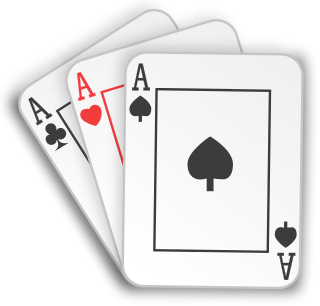
Teen patti is a gambling card game. Teen Patti originated in India and is popular throughout South Asia. It originated in the English game of three-card brag, with influences from poker. It is also called flush or flash in some areas.
Poker tools are a variety of software or web-based applications that allow the statistical analysis of poker players, games or tournaments.
The following is a glossary of poker terms used in the card game of poker. It supplements the glossary of card game terms. Besides the terms listed here, there are thousands of common and uncommon poker slang terms. This is not intended to be a formal dictionary; precise usage details and multiple closely related senses are omitted here in favor of concise treatment of the basics.
Baduci is a combination of Badugi poker and deuce to seven triple draw, and uses hand values similar to lowball. The pot in this game is split much like high-low split between the best Badugi hand and the best 2-7 triple draw hand. The betting structure and overall play of the game is nearly identical to a standard poker game using blinds. A players' hand contains five cards, where only four cards are used to determine the best Badugi hand and five cards are used to determine the triple draw hand. During each of three drawing rounds, players can trade zero to five cards from their hands for new ones from the deck.
Draw poker is any poker variant in which each player is dealt a complete hand before the first betting round, and then develops the hand for later rounds by replacing, or "drawing", cards.
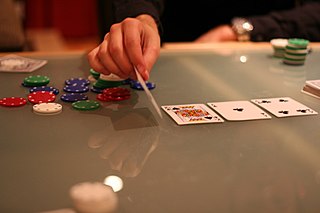
Community card poker refers to any game of poker that uses community cards, which are cards dealt face up in the center of the table and shared by all players. In these games, each player is dealt an incomplete hand face down, which are then combined with the community cards to make a complete hand. The set of community cards is called the "board", and may be dealt in a simple line or arranged in a special pattern. Rules of each game determine how they may be combined with each player's private hand. The most popular community card game today is Texas hold 'em, originating sometime in the 1920s.
References
- 1 2 3 Robert's Rules of Poker version 11 by Bob Ciaffone Chapter The Showdown.
- ↑ Showdown Shame - Part 1 article in Card Player Magazine by Bob Ciaffone.
- ↑ Showdown Shame - Part 2 article in Card Player Magazine by Bob Ciaffone.
- ↑ Showdown Shame - Part 3 article in Card Player Magazine by Bob Ciaffone.
- ↑ 'I Want to See That Hand': Several cardrooms redefine a rule article in Card Player Magazine by Mike O'Malley.